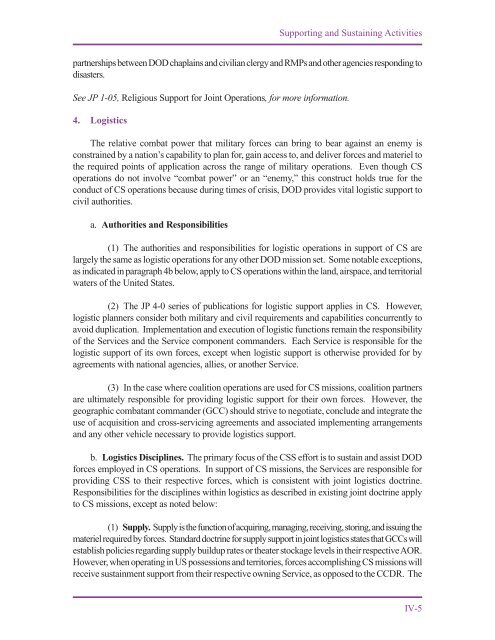JP 3-28, Civil Support - Federation of American Scientists
JP 3-28, Civil Support - Federation of American Scientists
JP 3-28, Civil Support - Federation of American Scientists
Create successful ePaper yourself
Turn your PDF publications into a flip-book with our unique Google optimized e-Paper software.
<strong>Support</strong>ing and Sustaining Activities<br />
partnerships between DOD chaplains and civilian clergy and RMPs and other agencies responding to<br />
disasters.<br />
See <strong>JP</strong> 1-05, Religious <strong>Support</strong> for Joint Operations, for more information.<br />
4. Logistics<br />
The relative combat power that military forces can bring to bear against an enemy is<br />
constrained by a nation’s capability to plan for, gain access to, and deliver forces and materiel to<br />
the required points <strong>of</strong> application across the range <strong>of</strong> military operations. Even though CS<br />
operations do not involve “combat power” or an “enemy,” this construct holds true for the<br />
conduct <strong>of</strong> CS operations because during times <strong>of</strong> crisis, DOD provides vital logistic support to<br />
civil authorities.<br />
a. Authorities and Responsibilities<br />
(1) The authorities and responsibilities for logistic operations in support <strong>of</strong> CS are<br />
largely the same as logistic operations for any other DOD mission set. Some notable exceptions,<br />
as indicated in paragraph 4b below, apply to CS operations within the land, airspace, and territorial<br />
waters <strong>of</strong> the United States.<br />
(2) The <strong>JP</strong> 4-0 series <strong>of</strong> publications for logistic support applies in CS. However,<br />
logistic planners consider both military and civil requirements and capabilities concurrently to<br />
avoid duplication. Implementation and execution <strong>of</strong> logistic functions remain the responsibility<br />
<strong>of</strong> the Services and the Service component commanders. Each Service is responsible for the<br />
logistic support <strong>of</strong> its own forces, except when logistic support is otherwise provided for by<br />
agreements with national agencies, allies, or another Service.<br />
(3) In the case where coalition operations are used for CS missions, coalition partners<br />
are ultimately responsible for providing logistic support for their own forces. However, the<br />
geographic combatant commander (GCC) should strive to negotiate, conclude and integrate the<br />
use <strong>of</strong> acquisition and cross-servicing agreements and associated implementing arrangements<br />
and any other vehicle necessary to provide logistics support.<br />
b. Logistics Disciplines. The primary focus <strong>of</strong> the CSS effort is to sustain and assist DOD<br />
forces employed in CS operations. In support <strong>of</strong> CS missions, the Services are responsible for<br />
providing CSS to their respective forces, which is consistent with joint logistics doctrine.<br />
Responsibilities for the disciplines within logistics as described in existing joint doctrine apply<br />
to CS missions, except as noted below:<br />
(1) Supply. Supply is the function <strong>of</strong> acquiring, managing, receiving, storing, and issuing the<br />
materiel required by forces. Standard doctrine for supply support in joint logistics states that GCCs will<br />
establish policies regarding supply buildup rates or theater stockage levels in their respective AOR.<br />
However, when operating in US possessions and territories, forces accomplishing CS missions will<br />
receive sustainment support from their respective owning Service, as opposed to the CCDR. The<br />
IV-5

















